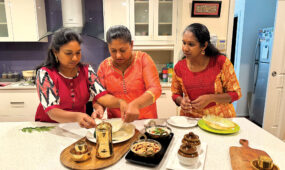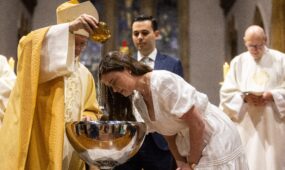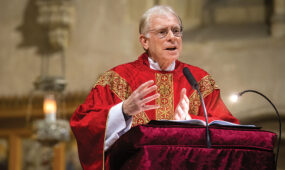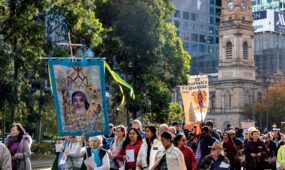Persistence pays off
Opinion
The Gospel from Matthew Chapter 15 for the 20th Sunday in Ordinary time Year ‘A’, which we proclaimed recently, featured the Canaanite woman ‘taking Jesus on’. Of the many elements in this Gospel, one that struck me this year was that of perseverance and persistence.

One of the great blessings of the current liturgy is the ‘richer fare’ we now have of the Word of God. I never cease to marvel at how aptly the Word of God, proclaimed in the daily readings, has that delightful knack of speaking to us, challenging us in the here-and-now.
While I’m told this does require something of a receptive ear and an open heart, many spiritual writers remind us that we ought to expect that God will actually speak to us. Where better than in the liturgy and the Liturgy of the Word for this to happen.
Advertisement
For us that ‘Word’ is of course the Word, Jesus, Risen and sitting at the right hand of the Father. He is God’s Word to us. A word embodied. A word spoken to us; a word spoken to me. I smile at God’s intimate persistence. God just keeps on knocking on the door of our heart; speaking the Word that is at times a comfort; at times a challenge and consolation, yet always a Word that draws us into communion with the Trinity.
I am still saddened when I hear people say that they want to ‘get the readings out of the way’ so we can get to the ‘real’ part of the Mass where Jesus is truly present. The constant understanding of the Eucharist, right from the beginning when we called it simply ‘the breaking of the bread’ until now, has been that when the Word of God is proclaimed in the Liturgy of the Word, it is God truly present and speaking to us. It is the Risen One, sent by the Father who brings God’s Word to us and sows it in our heart. It is the ‘other hand of God’, the Holy Spirit, who continually seeks to open our ears and hearts and make it fruitful in our lives.
The profound lessons of the journey of the Plenary Council, and now the Synod, are that our encounter with God begins by listening, and first listening to what God wishes to say to us, not that which we would wish to say to God, that comes later. Thank God for God’s persistence.
Upon hearing the Gospel for the 20th Sunday, I smiled. So often we commend, and rightly so, the Canaanite woman for her tenacity and persistence. To me it was an understanding of how God patiently waits for us. It is God who is like the Canaanite woman, with us as the ones like Jesus.
At first Jesus is reluctant to do anything for her, for his mission was primarily to Israel. Might we be a little reluctant to hear God’s Word?
He puts her off and is quite brusque to her. By not listening to the Word of God might we be the same? However, she (God) wins through by her (God’s) persistence and her (God’s) determined confidence in Jesus’ (our) healing powers.
Advertisement
The disciples get fed up with her shrieking after them, and ask Jesus to cure her daughter, which he does. How often are the distractions and other elements of our lives distracting us?
Persistence. Not easy in an instant world. In the Liturgy of the Word, God’s persistence ought to meet ours. Do we give up too easily? God doesn’t, be warned!
The Gospel finishes with Jesus saying: ‘Woman you have great faith. Let your wish be granted.’ Healing and new resolve come from that encounter for we are told that ‘and from that moment her daughter was well again’.
No one is untouched by an encounter with Christ. This is never more so than in the liturgy and at the two tables: of the Word and of the Eucharist.
Wrapping and present
Some time ago one of my nephews turned 21. I was fortunate to be able to be present for the party. Towards the end of the evening it came time for the speeches and presents. In due course out came a huge gift, wrapped superbly, much to the delight of all present. Clearly this is something big! To this day I can’t remember what the present was, except it was small and much unwrapping and discarding of paper had to be done before the present was revealed.
Most, not in the know, had clearly mistaken the wrapping for the present. Reflecting with different groups in the lead-up to the coming first session of the Synod, sometimes we might do something similar.
We have a wrapping we are calling ‘Instrumentum laboris’ (IL), the working document, admittedly not an easy title, yet a word to get us started. The wrapping leads us to the core, Synodality, not a catchy or self-explanatory title yet a word that has been used in the Church from the earliest times, meaning Together on the Way, and the three gems with which we have been asked to engage: Communion, Participation and Mission.
I have had a chance to read the IL several times. It is a good read. When I speak with some people about it I wonder if they have actually read it or have simply read someone else’s opinion about it.
It is the set-up document of the Synod. The John the Baptist type document that points us, with the Spirit’s prompting, to the presence of Christ.
So often we judge books by covers; jump to conclusions and are driven by fear rather than being drawn by hope. If we gently unwrap the IL and place aside the wrapping we can delight in the present. For us, the present is the life of the Trinity. For this communion we were born; for this communion we long; for this communion the whole work of the Church gives way until we live it in its fullness. God has promised to be with the Church, always. God, like the persistent Canaanite woman, does not give up.
Might I ask you for your continued prayer for the work of the Synod which begins in late September, and which seeks to assist the Church in its mission to the people of our time. The Synod will help to shape our priorities for the foreseeable future. Together with all those attending from Oceania, I consider myself to be blessed to be a member of the Synod.
God is good, good indeed.







